From the Header file complete the Functions in your cpp file
From the Header file complete the Functions in your .cpp file. Do NOT use <cstring> library. recreate all functions and do NOT change any class specification. use buffer as your Destination array.
Follow the instructions below.
intialize - allocates the memory and sets the word parameter into the ADT. Also sets the wordLength.
deallocate - deallocates the memory used in the ADT.
copy - resizes (only if necessary) the destination buffer and copies the parameter\'s buffer into the calling ADT. Updates the wordLength as needed.
length - gets the wordLength.
concat - appends the String parameter\'s buffer to the end of the calling object\'s buffer. The destination buffer is resized (if needed) and wordLength is updated.
compare - compares the parameter\'s buffer to the calling object\'s buffer. Returns -1 if the calling ADT is less, 0 if both are the same, 1 if the calling ADT is greater.
print - prints out the ADT String.
9 #ifndef string-hpp 10 #define string..hpp 12 #include «stdio.h> 13 14 class Stringt 15 16 public: 17 18 19 20 int length) 21 void initialize(char *); void deallocate(); void copy(const String&); void concat (const String&); int compare(const String&); void print); 23 24 25 private: 26 27 28 ; 29 30 31 #endif /* string.hpp */ 32 char * buffer; int wordLength;Solution
#include <cstdlib>
#include <iostream>
#include <string>
#include \"mystring.h\"
#define string mystring
using namespace std;
void check (string s, string name){
cout << \"checking \" << name << endl;
cout << name << \" contains \" << s << endl;
cout << name << \" capacity() is \" << s.capacity() << endl;
cout << name << \" length() is \" << s.length() << endl;
cout << name << \" size() is \" << s.size() << endl;
cout << name << \" max_size() is \" << s.max_size() << endl << endl;
}
int main(int argc, char** argv) {
cout<<\"This is Lab 5\"<<endl;
string s1(\"Hello, World!\");//step 2
string s1name(\"s1\");//step 3
check(s1,s1name);//step 4
check(s1,s1name);//step 5
cout << \"---Testing assignment operator---\ \ \";
{
string s2;
s2=s1;
string s2name(\"s2\");
check(s2,s2name);
if(s1==s2)
cout<<\"comparison true\ \";
else
cout<<\"comparison false\ \";
}
check(s1,s1name);
string s3(\"check assignment\");
s3=s3;//checking to see if operator= is used when they are the same object.
check(s3,\"s3\");
cout<<\"Lab 5 ends\"<<endl;//step6
// //clear check
// s3.clear();
// check(s3,\"s3\");
// if(s1==s3)
// cout<<\"comparison true\ \";
// else
// cout<<\"comparison false\ \";
// reserve check
// mystring::size_type res;
// res=40;
s3.reserve(40);//still working on reserve
check(s3,\"s3\");
cout<<\"in main buf size\"<<s3.capacity()<<endl;
s3.reserve(5);
check(s3,\"s3\");
// char* test=s3.begin();
// cout<<&test<<endl;
// cout<<&s3<<endl;
//empty check
// string s4;
//
// if (s4.empty())
// cout<<\"Empty is true\ \";
// else
// cout<<\"Empty is false\ \";
return 0;
}
#ifndef MYSTRING_H
#define MYSTRING_H
#include <iostream>
#include <math.h>
#include <cstring>
using namespace std;
class mystring {
public:
// types with scope in this class
typedef unsigned int size_type;
typedef char * iterator;
typedef const char * const_iterator;
static const long int npos = 1073741824;
// default constructor
mystring();//good
// other constructors
mystring(const char *);//good
// copy constructor
mystring(const mystring& orig);//
// destructor
~mystring();////
// iterators
iterator begin();//good
iterator end();//good
//=== memory related ===
// change buffer size to n
void reserve(size_type n);
size_type size() const;////good returns len
size_type length() const;////good returns len
size_type capacity() const;////good returns buf_size
size_type max_size() const;////good
bool empty() const;////good
//=== overloading operators ===
// assignment operator
mystring& operator=(const mystring&);////
// mystring& operator=(const char *);
// array notation
char operator[](size_type pos) const;
char& operator[](size_type pos);
// append
mystring& operator+=(const mystring& str);
mystring& operator+=(const char * str);
//=== methods that modifiy the string
void clear();////good
void push_back(char c);
mystring& append(const mystring& str);
mystring& append(const char * str);
mystring& insert(size_type pos, const mystring& str);
mystring& insert(size_type pos, const char * str);
mystring& replace(size_type start, size_type span, const mystring& str);
mystring& replace(size_type start, size_type span, const char * str);
//=== conversion to c string
const char * c_str() const;//
private:
// pointer to the memory location where string is stored as a c-style
// string
char * ptr_buffer;
// the size of the memory in terms of bytes or characters capable of going into it currently
size_type buf_size;
// number of characters currently in the memory not including the
// terminating null character
size_type len;
};
#include \"mystring.h\"
// default constructor provided for lab 5
mystring::mystring() {
ptr_buffer = new char[1];
*ptr_buffer = \'\\0\';
buf_size = 1;
len = 0;
}
// constructor from c-style string or \"abc\" provided for lab 5
mystring::mystring(const char * s) {
len = strlen(s);
buf_size = len + 1;
ptr_buffer = new char[buf_size];
strcpy(ptr_buffer, s);
}
// copy constructor to be implemented in lab 5
mystring::mystring(const mystring& orig) {
len=orig.length();
ptr_buffer=new char[len+1];
buf_size=len+1;
for(int n=0 ;n<buf_size; n++ )
{
ptr_buffer[n]=orig.ptr_buffer[n];
}
ptr_buffer[buf_size]=\'\\0\';
}
void mystring::reserve(size_type n)
{
cout<<\"cccccc:\"<<capacity()<<endl;
if( n > capacity() )
{
const char* temp = ptr_buffer;
ptr_buffer = new char[n];
memcpy(ptr_buffer, temp, len+1);
delete [] temp;
buf_size=n;
cout<<\"bbbbbuf size\"<<buf_size<<endl;
}
// char *temp;
//
// temp=new char[n];
//
// int i=0;
//
// for(;i<=len;i++)
// {
// temp[i]=ptr_buffer[i];
//
// }
// buf_size=n;
//
// delete [] ptr_buffer;
//
// ptr_buffer=temp;
//
}
mystring::iterator mystring::begin()//think is working correctly
{
iterator it=ptr_buffer;
return it;
}
mystring::iterator mystring::end()//think is working correctly
{
iterator it=ptr_buffer+len;
return it;
}
// one of the over loaded assignment operator to be implemented // assignment 3 (or for lab 5 if you have more time)
mystring& mystring::operator=(const mystring& orig){
if(this!=&orig)
// {
// cout<<\"this==&mystring if statment activated\ \";//comment out after testing
// break;
// }
{
delete this->ptr_buffer;
this->len=orig.len;//length();
this->ptr_buffer=new char((this->len)+1);
this->buf_size=(this->buf_size)+1;
cout<<\"Using assignment operator=\"<<endl;
for(int n=0;n<this->buf_size;n++)
{
this->ptr_buffer[n]=orig.ptr_buffer[n];
}
this->ptr_buffer[buf_size]=\'\\0\';
return *this;
}
}
// some simple methods provided for lab 5
mystring::size_type mystring::size() const {
return len;
}
mystring::size_type mystring::length() const{
return len;
}
mystring::size_type mystring::capacity() const{
return buf_size;
}
mystring::size_type mystring::max_size() const{
return (int)pow(2,30) -4 ;
}
bool mystring::empty() const
{
if(len==0)
return true;
else
return false;
}
// destructor to free space implemented for lab 5
mystring::~mystring() {
delete [] ptr_buffer;
}
// provided for lab 5 so we may cout mystring
ostream& operator<<(ostream& out, const mystring& str) {
out << str.c_str();
return out;
}
// provided for lab 5 to support the implementation of <<
const char * mystring::c_str() const {
return ptr_buffer;
}
char mystring::operator[](size_type pos) const
{
return *(ptr_buffer+pos);
}
void mystring::clear()
{
char *temp;
temp=new char[1];
temp[0]=\'\\0\';
ptr_buffer=temp;
buf_size=0;
len=0;
}
void mystring::push_back(char c)
{
}
bool operator==(const mystring& lhs, const mystring& rhs)
{
if(lhs.length()==rhs.length())
{
for(int i=0; i<lhs.length();i++)
{
if(lhs[i]!=rhs[i])
return false;
}
return true;
}
return false;
}
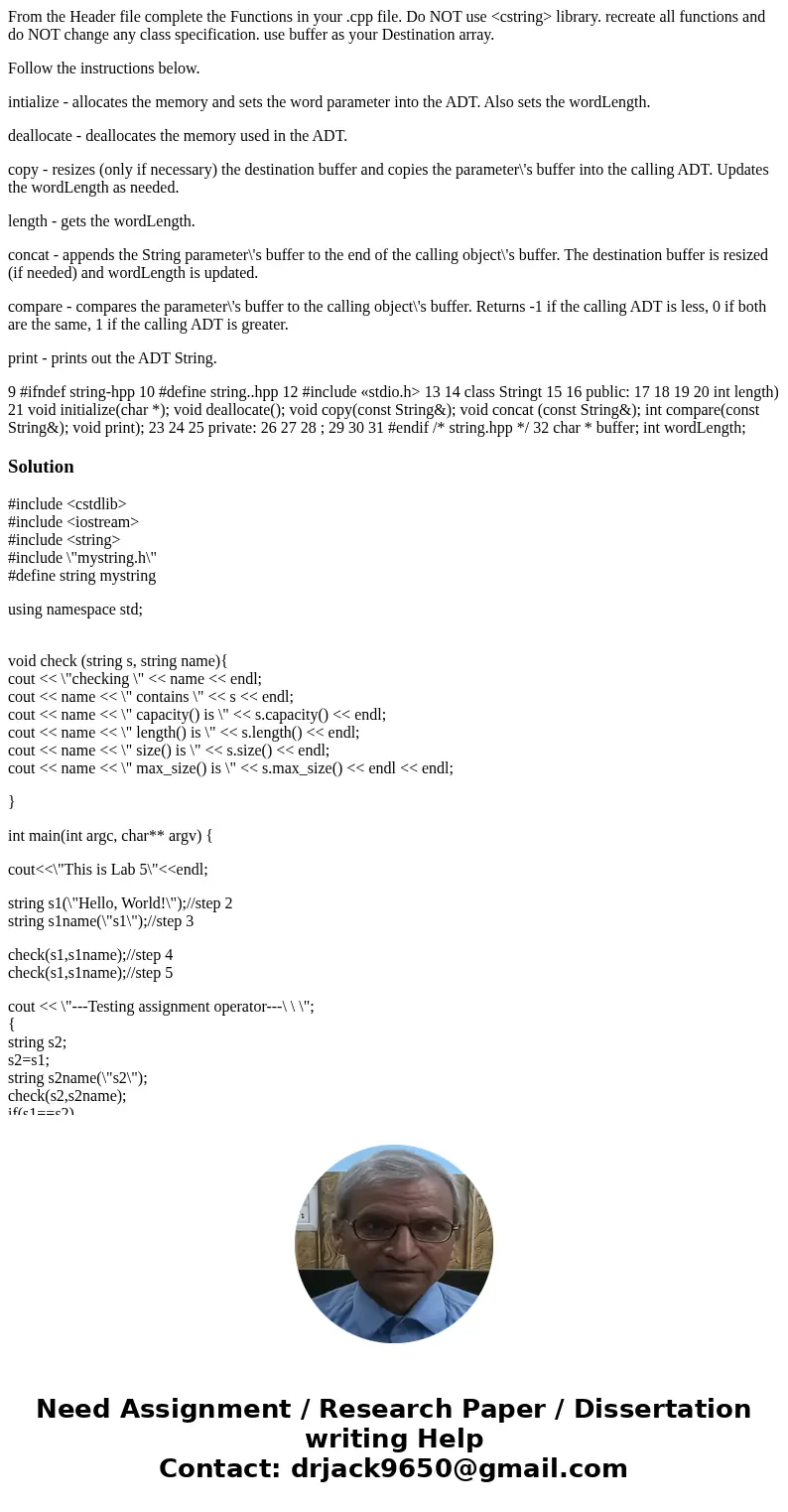
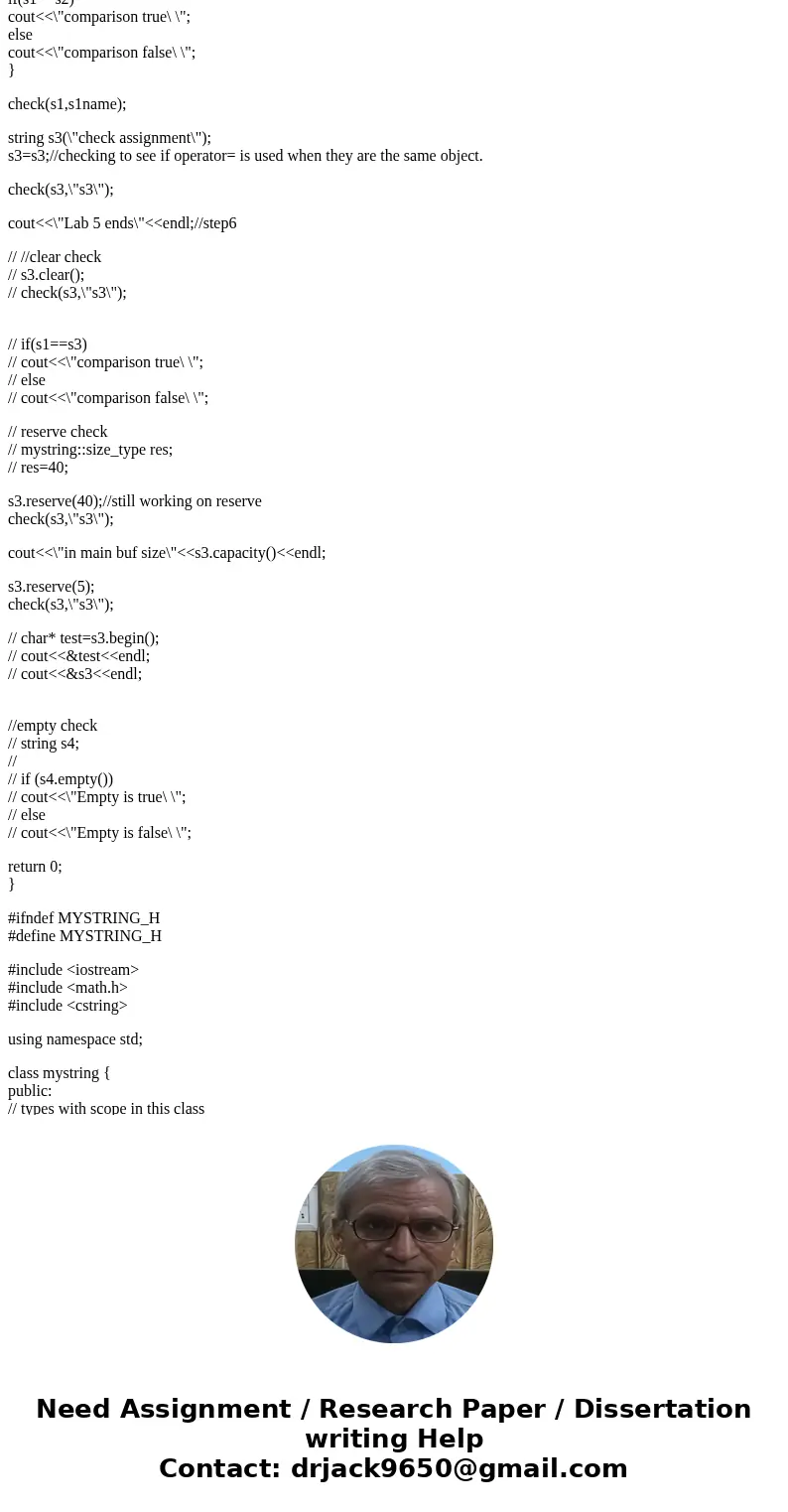
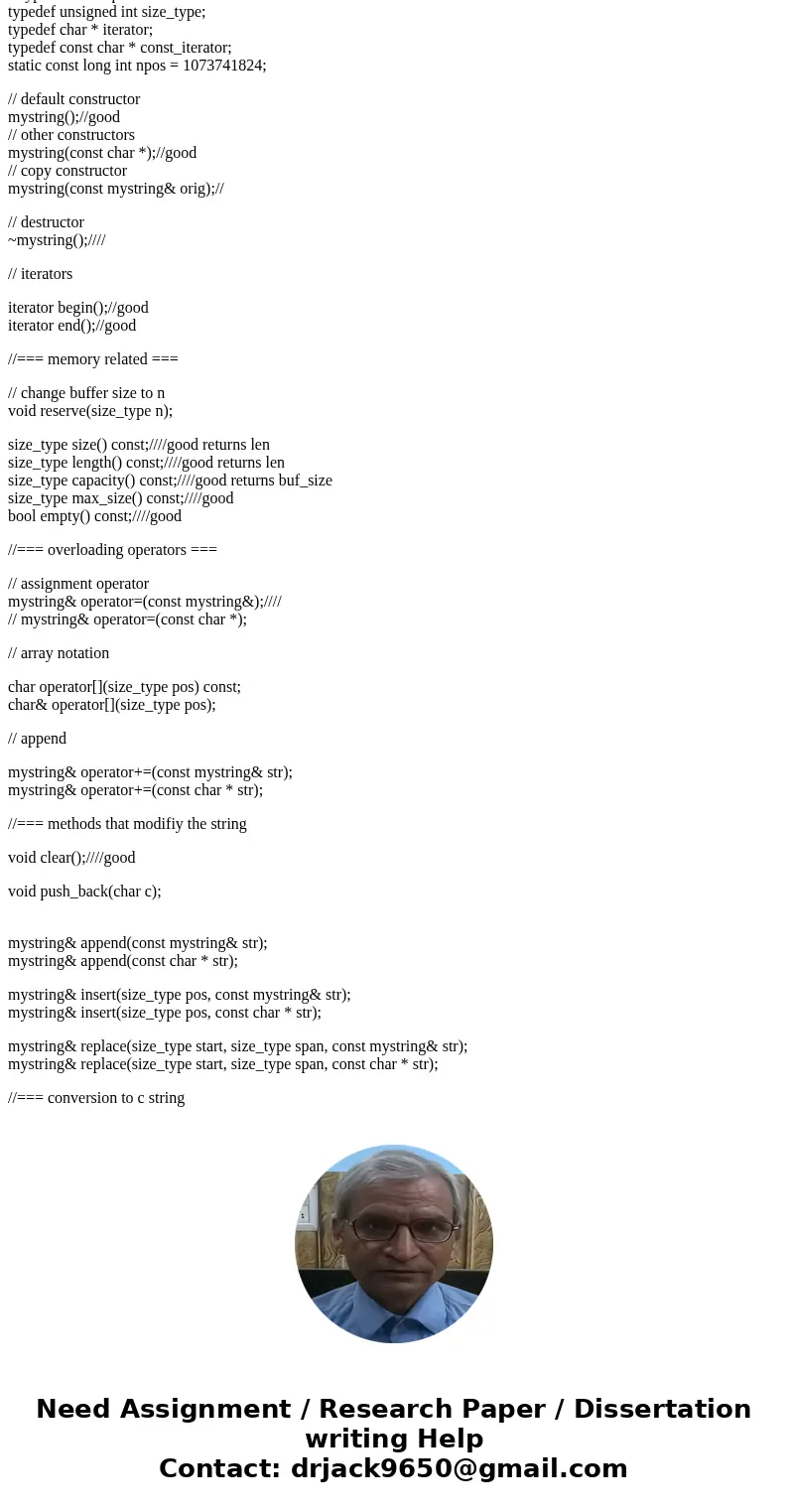
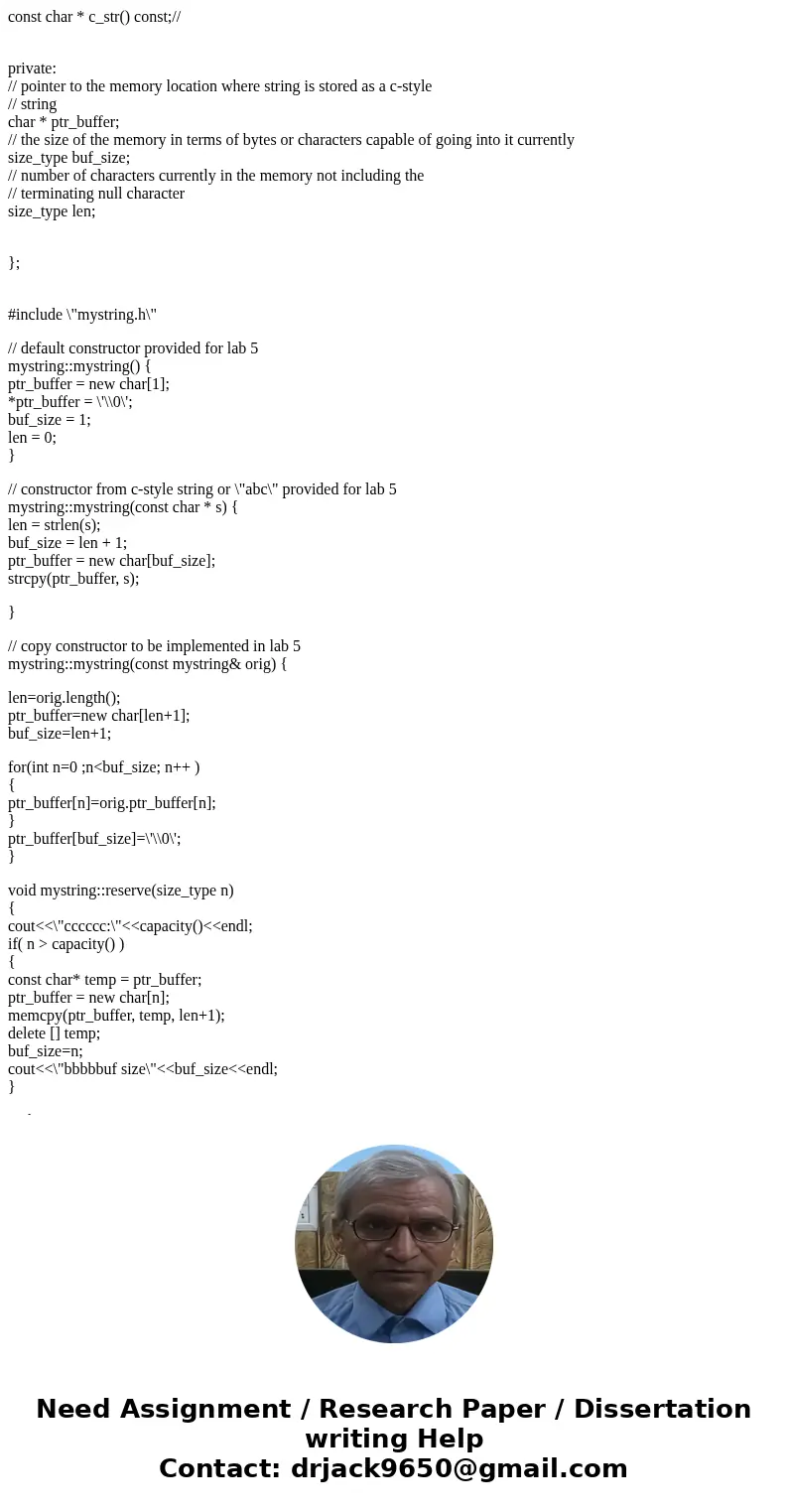
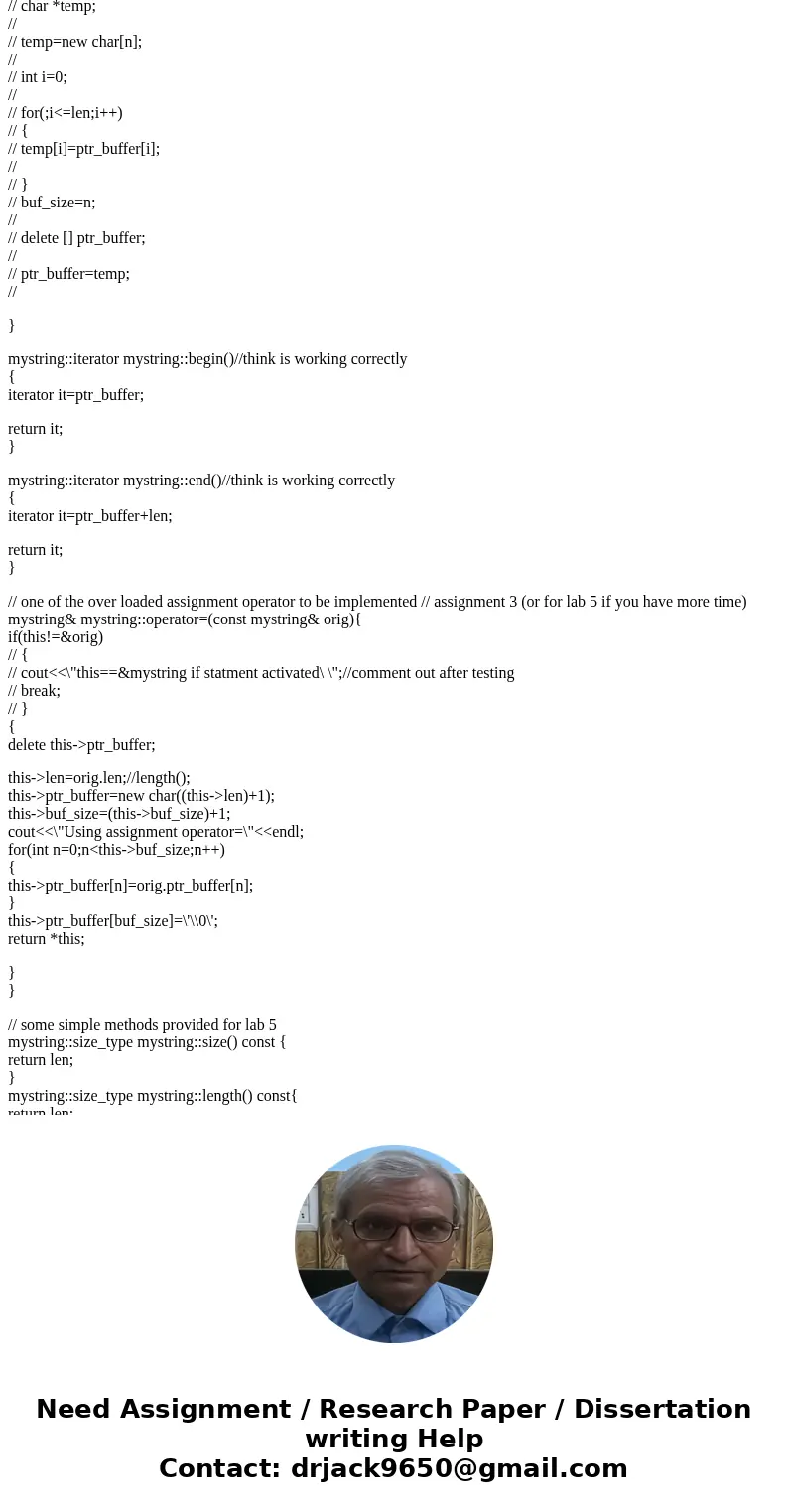
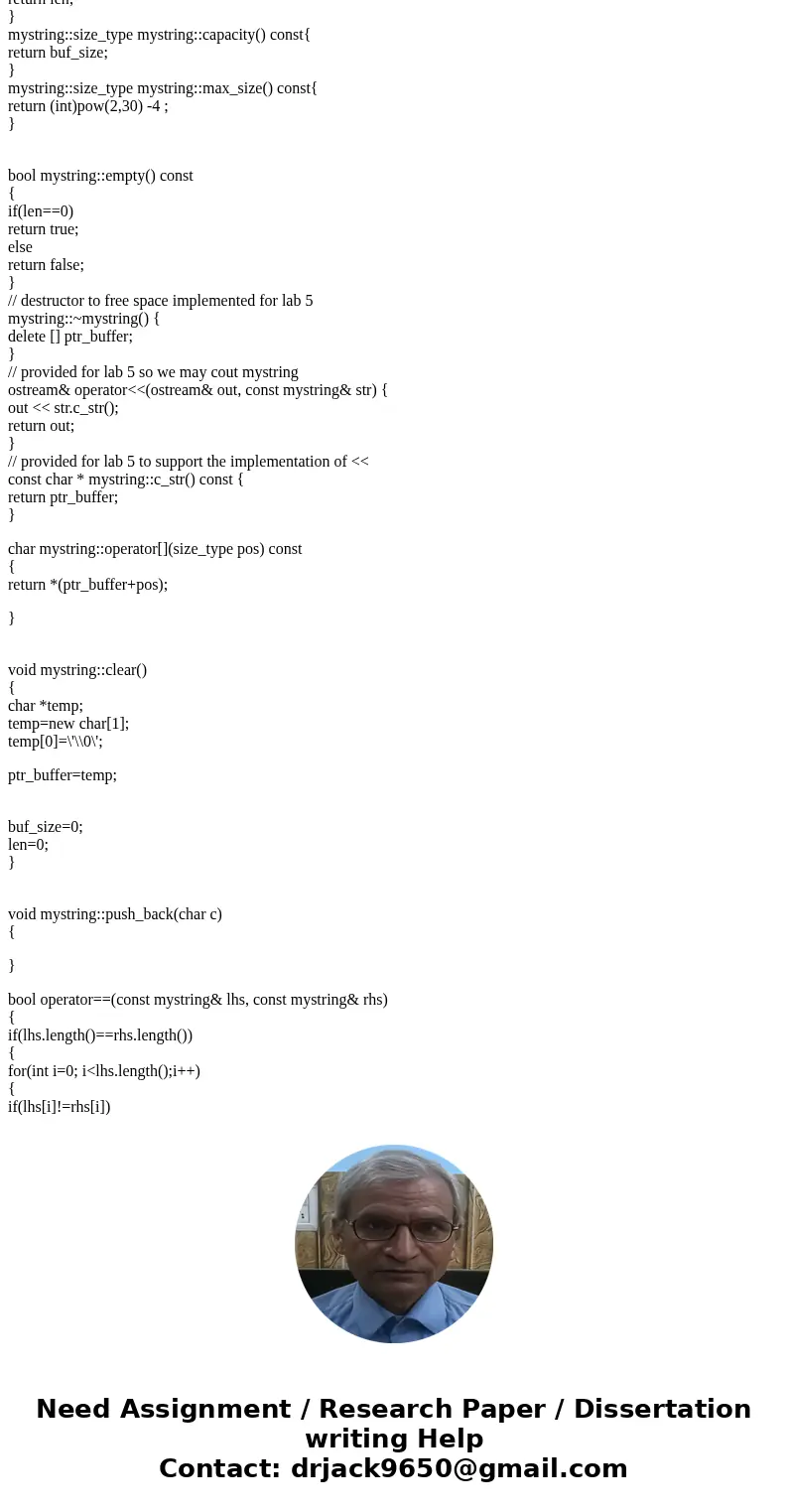
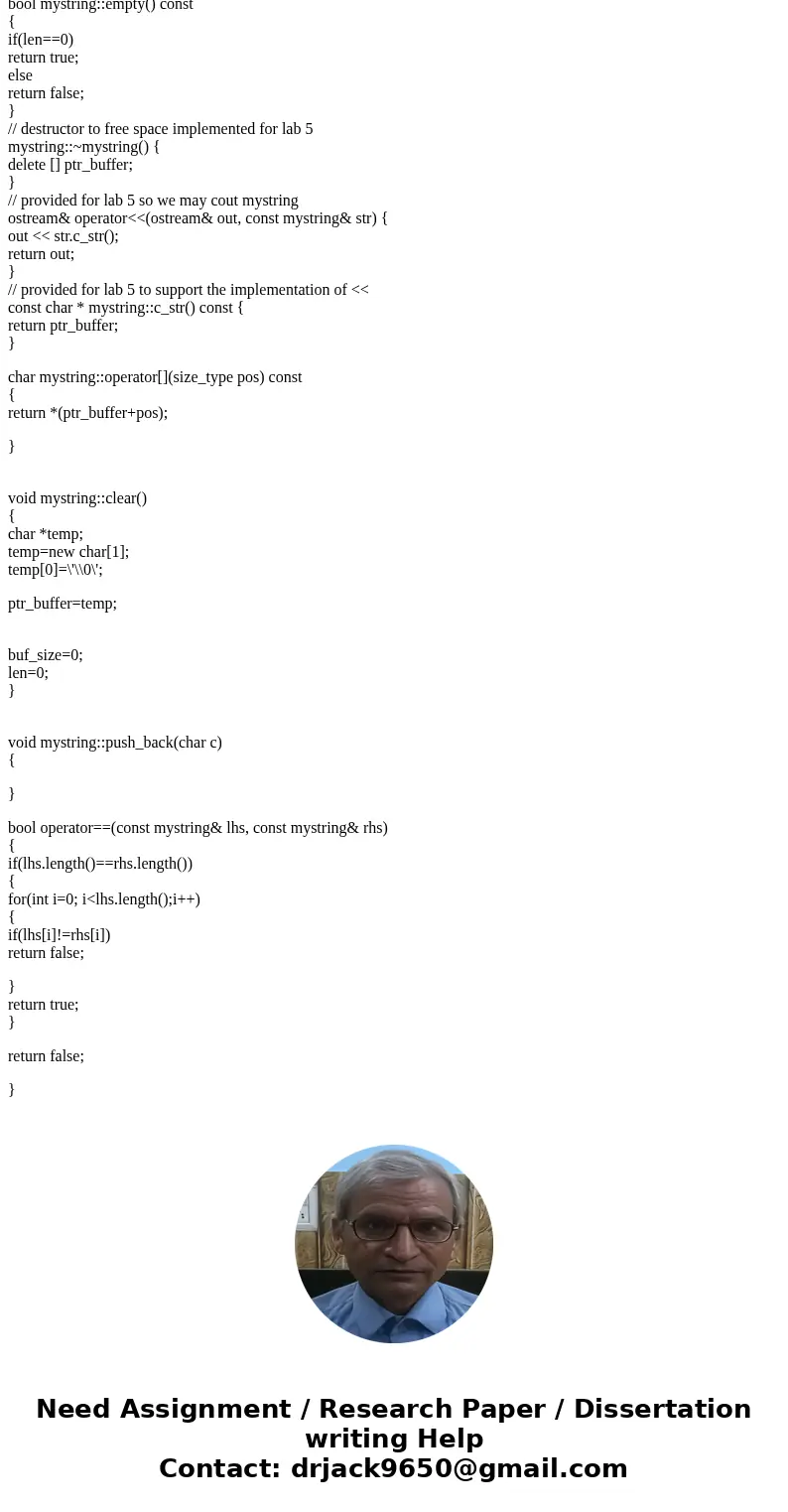
 Homework Sourse
Homework Sourse